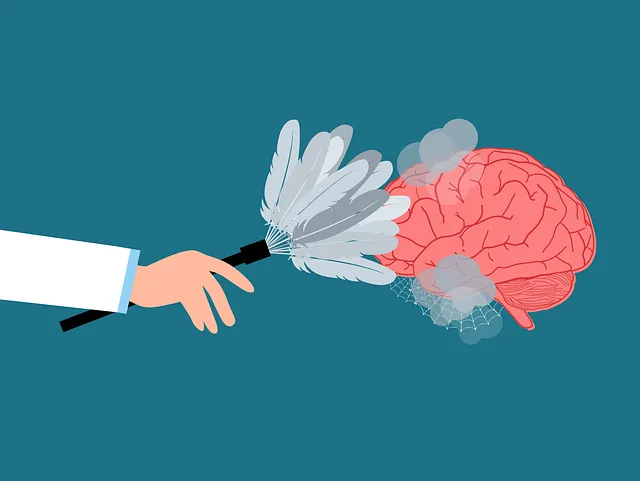Burnout among healthcare providers is a significant concern impacting well-being, patient care, and system performance. Kaiser Permanente Wheat Ridge's mental health centers face unique challenges like high-stress environments, heavy workloads, and exposure to trauma. They've successfully addressed these issues through targeted strategies, including stress management workshops (Compassion Cultivation Practices, Social Skills Training, Emotional Intelligence), regular mental health check-ins, peer support, and accessible counseling services. These initiatives foster a supportive work environment, boost job satisfaction, and reduce burnout, as evidenced by positive Kaiser Permanente mental health center reviews in Wheat Ridge. By prioritizing staff well-being through self-care practices, open communication, and stigma reduction, healthcare organizations can maintain dedicated and engaged professionals who deliver quality patient care.
Healthcare provider burnout is a growing concern, impacting patient care and organizational success. This article explores strategies to combat this pervasive issue, focusing on the vital role of mental health support. We examine the innovative approach of Kaiser Permanente Wheat Ridge, a leading mental health center, and its impact on provider well-being. Additionally, we provide practical guidelines for healthcare organizations and workers to implement effective burnout prevention tactics, fostering a culture that prioritizes self-care and overall wellbeing.
Keywords: Kaiser Permanente mental health center reviews Wheat Ridge, burnout prevention strategies, healthcare provider well-being.
- Understanding Burnout Among Healthcare Providers: A Look at the Issues
- The Role of Mental Health Support: Kaiser Permanente Wheat Ridge as a Model
- Implementing Effective Burnout Prevention Strategies in Healthcare Organizations
- Fostering a Culture of Self-Care and Wellbeing: Tips for Healthcare Workers
Understanding Burnout Among Healthcare Providers: A Look at the Issues

Burnout among healthcare providers is a growing concern, impacting not only individual well-being but also patient care and overall healthcare system performance. It’s characterized by emotional exhaustion, depersonalization, and reduced personal accomplishment—a syndrome that develops over time due to prolonged stress. Healthcare providers, including those at Kaiser Permanente mental health centers in Wheat Ridge, often face unique challenges that contribute to burnout.
High-stress environments, heavy workloads, long hours, and exposure to traumatic events can take a toll on healthcare workers’ emotional well-being. Reviews of Trauma Support Services within these facilities highlight the importance of coping skills development and emotional well-being promotion techniques in mitigating burnout risks. By acknowledging these issues and implementing targeted strategies, healthcare organizations like Kaiser Permanente can foster healthier work environments, enhance job satisfaction, and ensure providers are equipped to offer optimal care to their patients.
The Role of Mental Health Support: Kaiser Permanente Wheat Ridge as a Model

At Kaiser Permanente Wheat Ridge, a leading mental health center receives consistently positive reviews for its comprehensive approach to healthcare provider burnout prevention. This model centers around fostering a culture of resilience and well-being through innovative programs like Compassion Cultivation Practices (CCP), Social Skills Training (SST), and Emotional Intelligence (EQ) workshops. These initiatives aim to equip medical professionals with the necessary tools to manage stress, improve patient interactions, and enhance their overall emotional intelligence—all vital components in mitigating burnout.
The center’s success lies in integrating these practices into daily operations, creating a supportive environment that encourages open dialogue about mental health. Healthcare providers at Kaiser Permanente Wheat Ridge report improved job satisfaction and reduced stress levels, attributing these gains to the continuous support and skill-building opportunities offered by the center. Reviews highlight the effectiveness of these strategies in preventing burnout, making it a beacon for other healthcare organizations seeking similar solutions.
Implementing Effective Burnout Prevention Strategies in Healthcare Organizations

Healthcare organizations, like Kaiser Permanente mental health centers in Wheat Ridge, play a pivotal role in fostering mental wellness among their employees. Implementing effective burnout prevention strategies is essential to maintain a healthy work environment and prevent staff depression. One key approach involves offering comprehensive stress management workshops tailored to address the unique challenges faced by healthcare professionals. These workshops can cover topics such as mindfulness techniques, time management skills, and resilience building, empowering workers with tools to navigate demanding situations.
Additionally, integrating depression prevention initiatives into the organizational culture is crucial. This may include regular check-ins with mental health professionals, peer support programs, and accessible counseling services. By prioritizing mental wellness and fostering an environment that encourages open conversations about stress and emotional well-being, healthcare organizations can effectively prevent burnout and ensure their staff remain dedicated and engaged in providing quality patient care.
Fostering a Culture of Self-Care and Wellbeing: Tips for Healthcare Workers

In the high-pressure environment of healthcare, fostering a culture that prioritizes self-care and wellbeing is essential to prevent burnout among workers. At Kaiser Permanente mental health centers in Wheat Ridge, for instance, initiatives aimed at promoting Mental Illness Stigma Reduction Efforts have been instrumental in creating supportive spaces where staff can openly discuss challenges and seek help without fear of judgment. These centers offer a range of services including counseling, stress reduction methods, and workshops on topics like mindfulness and resilience-building. By integrating these practices into daily routines, healthcare workers are encouraged to take care of their own mental health, thereby enhancing their ability to provide quality patient care.
In addition to structured programs, creating a culture of self-care involves simple yet powerful acts such as encouraging regular breaks, fostering open communication about workload, and providing access to mental health resources. Healthcare professionals should be reminded that taking time for themselves is not a sign of weakness but rather a crucial strategy for maintaining resilience and compassion in their work. Mental Health Awareness campaigns can play a significant role in normalizing conversations around stress and mental illness, ultimately reducing the stigma that often prevents workers from seeking help when needed.
Healthcare provider burnout is a pressing issue, but with the right strategies, organizations can foster a culture of self-care and prevent professional exhaustion. As seen in the successful model at Kaiser Permanente Wheat Ridge, mental health support plays a pivotal role in mitigating burnout. By implementing effective burnout prevention strategies and encouraging open discussions around self-care, healthcare facilities can enhance worker well-being and improve patient outcomes. For those seeking guidance, reviewing mental health center services like Kaiser Permanente Wheat Ridge offers valuable insights into creating sustainable solutions for a happier and healthier workforce.






